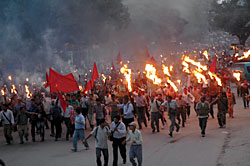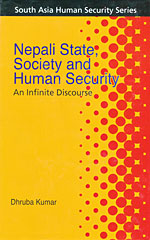 KIRAN PANDAY |
Kumar's broad-based definition of human security sets the stage. Drawing from the Human Development Report 1994, he declares that human security is "a child who did not die, a disease that did not spread, a job that was not cut, an ethnic tension that did not explode in violence, a dissident who was not silenced." Correspondingly, human insecurity "arises from worries about daily life", thereby encompassing everything from financial and economic insecurity to fear of violence at the hands of the state, common criminals or other groups due to sexual, religious or ethnic differences.
 Nepali State, Society and Human Security: An Infinite Discourse Dhruba Kumar Mohiuddin Ahmed, The University Press Ltd., Dhaka (2009) ISBN 978-9840-5-1794-7 Pages 365 |
"Maintaining civilian supremacy and stable civil-military relations does not mean that the armed forces should obey civilian orders imprudently", writes Kumar. It means the development of a code of conduct for the security forces, particularly with regard to their relationship with Nepali society. Such a code of conduct could be bolstered by parliamentary oversight committees.
Problems of human security reach far beyond security sector reform, as the scope of this book indicates. Political hooliganism and the ongoing army-PLA row are only the most obvious symptoms of a more general malaise that is manifest not only in rising crime and the burgeoning numbers of armed groups in the Tarai and the east but also in the human insecurity underlined by the epidemic in the west. These are all interrelated, Kumar seems to say, so the need of the hour is a security policy that can deal with them simultaneously and comprehensively.


